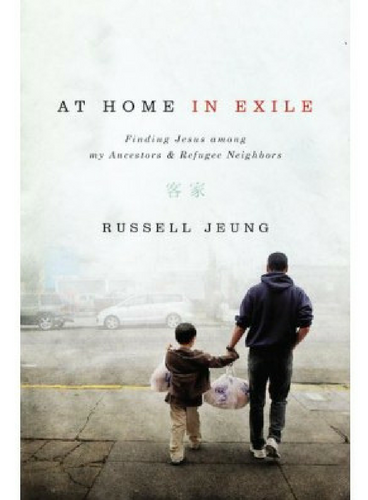by Russell Jeung, adapted from his new spiritual memoir, At Home in Exile: Finding Jesus among My Ancestors and Refugee Neighbors. Read it and you will gain wisdom and hope for your church’s ministry to those suffering from poverty, racism, inequality, and mass displacement and refugee crises.
1. Life as Exiles
Raising a family in the ghetto has been difficult for us, especially when we consider the safety and education of our children. Our community may not be the safest place to raise children, but it’s a great context in which to develop the values of
2. Guests of a Loving King
Our struggles at my home church and in our neighborhood continue. Individuals leave our congregation because of conflicts or trials, the same issues that the early church confronted. Racial hostilities and class inequalities continue to grow, leaving us angry and dispirited. However, Peter and Paul wrote that these difficulties are not new. We should expect them, because we are foreigners and exiles in a world with a different set of allegiances.
We can endure our momentary difficulties because Christians have a new citizenship—belonging to heaven and seeing themselves as heirs of the kingdom. We act as citizens of heaven now by caring for others with the same mutual responsibility with which Asians express love. Asian parents are willing to sacrifice everything—especially their hard work and careers—for their family. Their children see this sacrifice and respond through their own work ethic and gifts of honor. That’s one of the reasons why Asian immigrant children work so hard at school. We should respond to Jesus’ sacrifice for us in a similar way. Recognizing his gifts, we should want to offer all of our efforts in response. So even though we face suffering and setbacks, we continue to love with a deep reservoir of grace.
I understand Jesus’ sacrifice the most and feel most worshipful when I receive Communion. In the tangible form of bread and wine, I receive God’s gifts. I knew my father loved me when he would proudly take me out to eat at fine restaurants. I feel cared for when my mother cracks crab legs for me because she knows I love the meat but am too lazy to dig it out myself. God feeds me, too. Every week when
These love languages—through sacrifice and food—are how I receive God’s devoted love, even when circumstances of the world dictate otherwise.
3. Honored at Home in Exile
Ultimately, God is making us a home, where he will host us as his guests and children. This honor at a party, as exemplified in the Prodigal Son (
My neighbors and my daughters dislike being called “refugees.” They are disturbed by the stereotype of refugees as poor and hapless. Not surprisingly, they are ashamed of being displaced and without a home. As an Asian American, I can understand the deep sense of shame that a lot of Asians feel. I am very conscious of how others see me, and if I do lose face, I want to run away and hide.
The
This Asian view of salvation—that God rescues me from both my guilt and my shame—has revived my worship, such that I often weep upon taking Communion. I love singing about how God has brought me out of darkness and hiding into his marvelous light; about how I am unworthy, but he makes me blameless and pure; and that my shame is gone, and now I am honored as his child.
I’ve always wanted to be special and unique in this world. What I’ve learned from my family and gained from my refugee neighbors is a more precious gift. I have come to realize that both now and in the future, each of us is honored as a guest of the King. Even despite our temporary sufferings, in the midst of this fallen world, and in light of our shame, God knows our yearnings. And given his loyal love and his overwhelming peace, all of us—refugees, foreigners, aliens, and strangers—can learn to be at home in exile.
— Russell Jeung, At Home in Exile: Finding Jesus among My Ancestors & Refugee Neighbors
How To Use This Book
At Home in Exile will give you a vivid picture of one church’s fruitful approach to social justice. You will get inspired and informed in how you can effectively minister to those suffering from poverty, racism, mass displacement and refugee crises, and persistent inequality.
At Home in Exile is the spiritual memoir of Russell Jeung, a leading sociologist of Asian Americans, race, and religion. Jeung spent over two decades in assisting refugees to resettle in the United States, but he came to realize that he, too, was in exile.
You will find out how this exilic identity, being a “stranger and foreigner,” provides wisdom and hope for all Christians.
This is “the real story of an honest, embodied life of justice,” writes Dr. Soon-Chan Rah. “If every student I have ever taught said they wanted to be the next Russell Jeung—nothing would make me more proud. Please read this book.”

